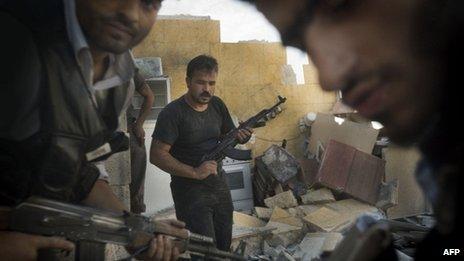Syria crisis: Rebels condemn opposition coalition
- Published

Syrian rebels accuse the National Coalition of failing the revolution
Rebels on the ground in Syria have launched a blistering attack on the Syrian opposition coalition outside the country.
A statement issued by the Revolutionary Movement in Syria, external said the coalition had failed to represent the Syrian revolution.
The criticism comes amid Russian and US efforts to arrange a peace conference on Syria in June.
An emergency UN debate on Syria was being held in Geneva on Wednesday.
The joint statement by four leading rebel groups inside Syria says the National Coalition for Syrian Revolutionary and Opposition Forces (SC) is unable to fulfil its obligations due to "ongoing discord".
A meeting of National Coalition members in Turkey has been marked by sharp divisions and a failure to agree on who should represent them at the June conference in Geneva.
"This negativity," the statement goes on "has led to the blatant interference of international and regional parties without respect to the national will."
Issued in the name of the Revolutionary Movement, the statement called for at least half the Coalition's leadership bodies to be made up of "revolutionary forces".
It is the clearest sign yet of the total disarray of the opposition leadership, as it faces the challenge posed by the Russian and American call to negotiate with the Syrian regime, says the BBC's Jim Muir in Beirut.
Geneva debate
Member states of the UN Human Rights Council are meeting to consider a resolution condemning human rights violations by the Syrian government and the use of "foreign combatants" in Qusair, as fighting around the strategic western town intensifies.
The resolution - drafted by Qatar, along with the US and Turkey - also calls for immediate access for UN aid agencies.
The "foreign combatants" are implied to be the Lebanese Shia movement, Hezbollah, who support the Syrian government. Qatar is widely believed to be supporting opposition forces, some of them also foreign.
As if to underline the divisions among foreign powers over the Syrian conflict, the Russian Foreign Minister, Sergei Lavrov, strongly criticised the draft resolution.
He accused the US of "actively promoting this extremely unwholesome initiative" and said it could undermine joint efforts to convene the June conference on ending the two-year conflict.
Mr Lavrov told Russian TV there was no alternative to a peace conference: "For this to happen, everyone has to work honestly, and not allow double standards - backing the conference and supporting this initiative in word, but then in deed taking steps that, in essence, are designed to undermine this proposal."
Starting the day's discussions in Geneva, UN Human Rights Commissioner Navi Pillay warned that the Syrian conflict was spinning out of control.
"The increasing number of foreign fighters crossing Syria's borders to support one side or the other is further fuelling the sectarian violence and the situation is beginning to show worrying signs of destabilising the region as a whole," she said.
Separately, representatives from 40 countries are expected to attend a conference in the Iranian capital, Tehran, Iranian officials were quoted as saying in local media.
EU embargo
International tensions over the Syrian conflict have increased further following an EU decision on Monday not to renew an arms embargo on Syria - a position Washington has backed.
Though EU ministers said there were no immediate plans to arm rebels in Syria, the UK Foreign Secretary William Hague has insisted there is nothing to stop nations doing so before a 1 August EU review of the situation in the country.
In response, Russia - a key ally of Syrian President Bashar al-Assad - said it would go ahead with deliveries of S-300 anti-aircraft missiles to Syria, and that the arms would help deter foreign intervention.
The S-300 is a highly capable surface-to-air missile system that, as well as targeting aircraft, has the capacity to engage ballistic missiles.
Unverified footage, apparently filmed by pro-government fighters, shows houses and cars on fire
This has in turn provoked the ire of Israel, which fears the weapons could end up in the hands of its Syrian rebels condemn coalition enemy Hezbollah.
Israel has said it would intervene to stop this, and is widely believed to have already carried out strikes on arms convoys in Syria.